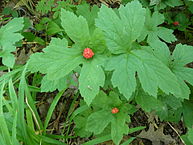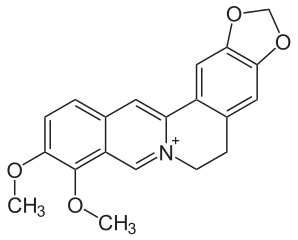In my investigation of finding western substitutes for Chinese herbs, I now turn to herbs that contain the alkaloid berberine, a chemical constituent found in many plants including goldenseal, goldthread (coptis), barberry (tree turmeric), Oregon grape, and phellodendron. Berberine accounts for the yellow color of these herbs and their bitter flavor along with many powerful effects as follows. Western herbalists generally consider berberine-containing herbs to be “bitter tonics” because they improve digestion by increasing appetite and stimulating the release of bile, which especially helps in the digestion of fats. This is a “tonic” in terms of strengthening the body’s ability to assimilate food. Not all bitter tonics contain berberine, however. According to Dr. Whitaker, berberine regulates metabolism as well as glucose production in the liver, stimulates the uptake of glucose into the cells, improves insulin sensitivity, boosts fat burning, lowers lipid levels, relaxes the arteries, increases blood flow, and lowers blood pressure. As a result, this constituent is useful for type 2 diabetes, heart disease, high cholesterol and triglycerides, hypertension, intestinal infections, and joint problems among others. And lately, there is evidence from studies that berberine might treat cancer, infectious yeast, and hypoglycemia.[1] The Western bitter tonic properties of berberine equate to the function of “clear Damp Heat” in Traditional Chinese Medicine (TCM). Herbs that clear Damp Heat are strongly antibacterial and possess alterative, febrifuge, antipyretic, antimicrobial, and anti-inflammatory properties. They treat disorders with yellow discharges, bacterial infections, diarrhea, dysentery, urinary tract pain or difficulty, jaundice, hepatitis, septicemia, and skin conditions such as eczema, acne and boils. In Ayurvedic medicine, berberine-containing herbs are similarly used as they lower high Pitta (bile) and reduce Kapha (Phlegm). Both these and the TCM functions listed above mesh with the Western use of berberine to regulate metabolism, burn fat, and lower cholesterol. As well, Native American Indians have long used berberine-containing herbs for many of these same conditions. With all these incredible benefits of this alkaloid, what are the downsides? First of all, it is cold in energy, which means anyone with Cold symptoms of no thirst, clear, copious, runny, and frequent discharges, excretions, secretions, and urination, cold extremities, pale face, lips and nails, lack of sweating, diarrhea or loose stools and poor appetite should avoid these plants or else combine them with herbs that have a warm energy. Secondly, its bitter flavor dries, drains, and firms — perfect for clearing Heat and draining Dampness, but detrimental for those with Blood or Yin deficiency. Since both Blood and Yin are moist, and Blood is warm in nature, berberine-containing plants can injure both substances in the body.
Berberine Buddies
The berberine-containing herbs goldenseal, goldthread (coptis), barberry (tree turmeric), Oregon grape, and phellodendron – can be considered “berberine buddies” since several may be substituted for each other. The first pairing of coptis–goldenseal follows while the second, barberry/Oregon grape–phellodendron, will be discussed in Part II. Goldthread/Coptis and Goldenseal The rhizome of the Chinese herb coptis (Coptis chinensis; huang lian; Ranunculaceae family) has a bitter flavor and cold energy and affects the Heart, Large Intestine, Liver, and Stomach. It has anti-inflammatory, antibiotic, antipyretic, cholagogue, and vasodilator properties. As a Chinese huang, or one of the “four yellows” (coptis, scutellaria, phellodendron and rhubarb), it is specific for treating inflammations and infections in the lower, middle and upper parts of the body such as high fever, irritability, meningitis, disorientation, delirium, sore throat, boils, carbuncles, abscesses, vomiting and/or acid regurgitation due to Heat in the Stomach, insomnia due to Heat in the Heart, hepatitis, gallstones, cirrhosis, jaundice, herpes, conjunctivitis, nosebleed, hemorrhage, blood in the urine, stool or vomit, dysentery, gastric pain (clears pylori bacteria), and bad breath – all due to Heat. As well, it is used topically for red, painful eyes, ulcerations of the tongue and mouth, canker sores, and scabies.

Hydrastis Canadensis Berries by James Steakley – Own work. Licensed under Creative Commons Attribution-Share Alike 3.0 via Wikimedia Commons
Goldenseal root (Hydrastis canadensis; Ranunculaceae family) also has a cold energy and bitter flavor and affects the Stomach, Intestines, Heart, and Liver. Already see the similarity? It has alterative, anti-inflammatory, aperient, and astringent properties. Goldenseal also treats Heat in the lower, middle and upper parts of the body such as infections, inflammations, hemorrhoids, leukorrhea, bladder infections, vaginitis, vaginal yeast, dysentery, constipation, colitis, ulcers, indigestion, heartburn, severe sore throat, fever, chronic middle ear infections, and conjunctivitis, again all caused by heat. It cleanses mucous membranes and lymph glands, dries yellow discharges, and treats liver diseases, tumors, cancer, hepatitis, jaundice, cirrhosis, and cancer. It also contracts blood vessels and inhibits excessive bleeding. Topically, it is used in eyewashes for inflamed eyes, or in salves, powders and tinctures for eczema, inflammation of the ear, and skin infections. (Note that both herbs should not be used if there are any signs of deficient Blood or deficient Yin with Heat signs, dizziness, blurry vision, nausea, vomiting, or diarrhea due to coldness, or during pregnancy. Excessive or long-term use (daily for two weeks or more) of goldenseal can weaken intestinal flora and diminish Vitamin B absorption.) It’s clear that goldenseal is a very close substitute for the Chinese herb, coptis, however, since goldenseal is on the “to watch” list for becoming endangered, if you can’t find the cultivated plant, then the reverse is also true – use coptis as a great substitute for goldenseal [1] Karta Purkh Singh Khalsa and Tierra, Michael, The Way of Ayurvedic Herbs, Lotus Press, 2008, p 101.


Thank you! I’ve been looking for a good explanation why bitter herbs, even foods make me feel so cold. I have some liver issues and I feel that some heat clearing herbs like Coptis and others work very well to reduce heat but I always have to quit because it makes me too cold and gives me these chills at bed time that prevent me from falling asleep. I also have kidney jing and yang deficiency so that is probably why I’m so sensitive to herb properties. In your experience, is there a balanced way to clear heat but also support kidney jing (without damaging yin) at the same time?